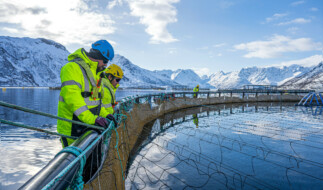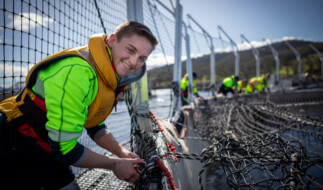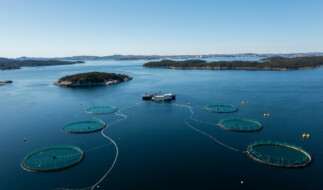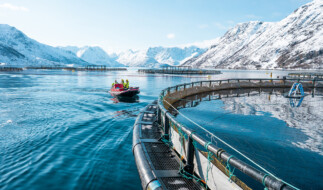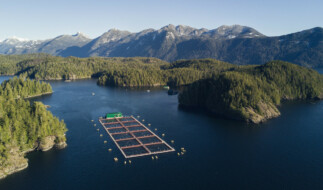As members of GSI, we are committed to making significant improvements in the sustainability of our salmon farming operations, and to reaching the highest levels of environmental and social performance. We have chosen to use the ASC Standard as a transparent means to benchmark our progress.
Our commitment to ASC certification
Within GSI, we have chosen to benchmark our sustainability journey by working with the Aquaculture Stewardship Council (ASC) Salmon Standard across our member farm sites.
Developed through stakeholder dialogue, and with over 150 indicators covering environmental, economic, and social performance, ASC is regarded as the most challenging and all-encompassing certification available. To achieve ASC certification, farms must complete a rigorous performance assessment and meet over 500 compliance points. After achieving ASC certification, farms undergo regular audits to ensure that they continue to meet the rigorous performance requirements.
What’s more, ASC shares our commitment to continuous improvement. So as they work to evolve their certification process in key areas such as animal welfare, feed and carbon reporting we will integrate these into our sustainability journey too.
As members of GSI, we also continue to work with a number of additional standards including Best Aquaculture Practices (BAP), and GlobalGAP (Good Agricultural Practices).
Choosing ASC-certified farmed salmon
Choosing ASC certification as our benchmark offers the opportunity to provide our customers and wider society with the assurance that we are operating in a responsible manner while also providing a high-quality product.
ASC-certified farmed salmon is recommended by the Monterey Bay Aquarium’s Seafood Watch program as a “Good Alternative”, and is therefore on the recommended list of seafood for seafood buyers and consumers to buy. When consumers purchase ASC-certified salmon, they can feel confident they are selecting seafood certified to the highest social and environmental standards.
You can learn more about the positive impact the ASC program is having in their impact dashboard.
Sustainable reporting based on the ASC standard
We also use the ASC standard as a reference point for tracking our progress towards improved sustainability, and transparently share all of this data via our annual Sustainability Report.
Our report is an industry first for showcasing data across different companies and different regions in one location online. The report covers data on:
- Antibiotic use
- ASC production
- Carbon footprint
- Certifications
- Community engagement
- Direct labor
- Edible yield
- Energy retention
- Feed conversion ratio
- Fish escapes
- Fish mortality
- Global production
- Non-medicinal treatments
- Occupation health and safety
- Protein retention
- R&D investment
- Sea lice counts
- Social compliance
- Use of marine ingredients in feed
Looking to the future
While 100% ASC certification across all our member farm sites will be difficult to achieve, we are really proud that in the first ten years of GSI, we have achieved over 60% of GSI member production to be ASC-certified. We hope that through continued collaboration, and the commitment to sharing best practices, we can continue to use the standard as our reference point in making measurable progress in our vision for a more sustainable future for salmon farming.
Frequently asked…
How do I know the farmed salmon I buy is responsibly raised?
When you're strolling down the grocery aisle in search of eco-friendly seafood, keep your eyes peeled for the green label of the Aquaculture Stewardship Council (ASC) - it's the gold standard for sustainability assurance in farmed seafood. When you see the ASC logo you know the fish has been raised to the highest standards and independently audited against a rigorous assessment for environmental, social , and animal welfare criteria. Don't worry if you don’t see the label, ask your grocer or fishmonger if they source certified farmed seafood varieties, like ASC or the Best Aquaculture Practices (BAP).
